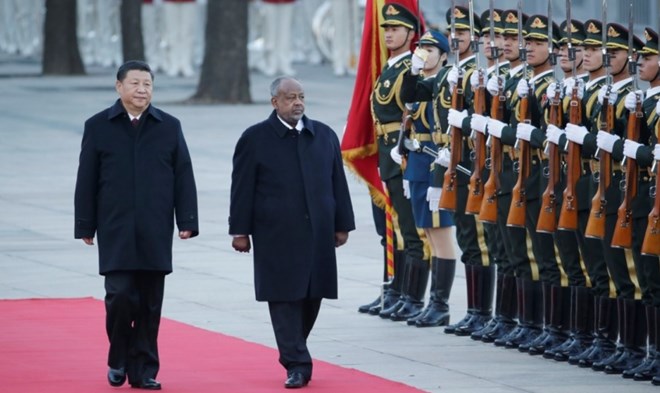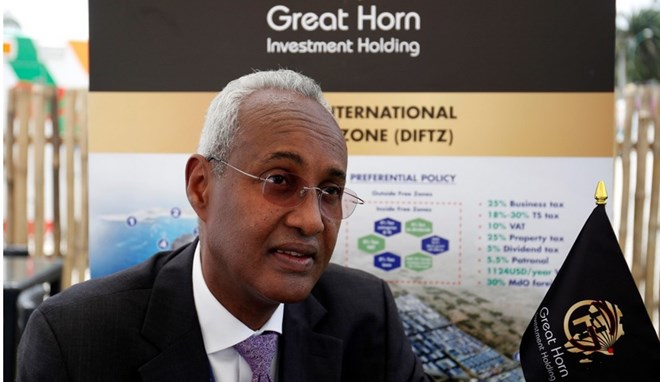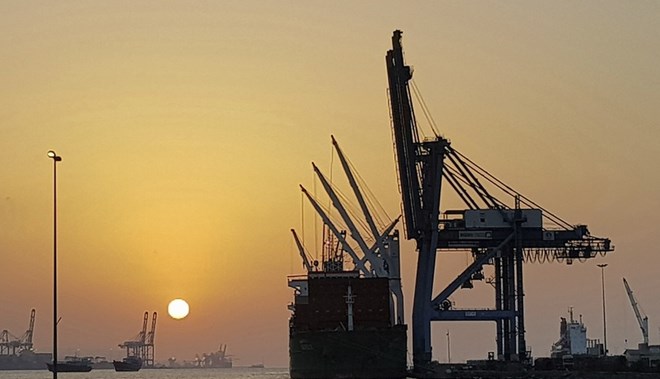
Monday April 9, 2018
Djibouti, with less than 1 million inhabitants, has become a military outpost for China, France, Italy and Japan

Chinese President Xi Jinping and Djibouti President Ismail Omar Guelleh take part in a welcoming ceremony at the Great Hall of the People in Beijing on Thursday. Photo: Reuters
Two fighter jets took off and roared over the Djibouti-Ambouli International Airport, a sprawling complex in this tiny African nation that is quickly becoming a strategic military and shipping outpost for the world.
Not far away, a massive US flag waved over transport planes parked in front of America’s only permanent military base in Africa, Camp Lemonnier, home to about 4,000 personnel.
Djibouti, an arid Horn of Africa nation with less than 1 million inhabitants, also has become a military outpost for China, France, Italy and Japan, with that nation’s first overseas base since the second world war.
Other powers including Saudi Arabia have expressed interest in the key location across the Bab el-Mandeb strait from the Arabian Peninsula and on one of the world’s busiest shipping corridors.
On the chaotic streets of what has been called the “Singapore of Africa”, the jostling between the United States and China for influence is plainly seen.
Before his firing by US President Donald Trump, then-secretary of state Rex Tillerson made a point of stopping in Djibouti on his Africa visit last month and noting its importance in the fight against the al-Qaida-linked al-Shabab extremist group in neighbouring Somalia and Islamic State in the region at large. The US carries out drone missions in Somalia and Yemen from Djibouti, but the military paused air operations last week after a jet crashed and a helicopter was damaged during a landing.
China’s first overseas military base, which was manned last year, is just a few miles from the US one. The head of the US Africa Command, General Thomas Waldhauser, earlier this year predicted that “there will be more”.
China’s economic interest is strong as well, with Djibouti borrowing up to US$957 million from the Export-Import Bank of China to finance several projects in recent years, according to the China Africa Research Initiative at Johns Hopkins University.
The Chinese built a new electrified rail line that links the capital of neighbouring Ethiopia, Africa’s second-most populous country and one of its strongest economies, with Djibouti as the nation aims to become a global shipping power.
“We sit on two of the busiest shipping lanes in the world. We are servicing the wider region, including some of the world’s fastest-growing economies,” the chairman of the Djibouti Ports and Free Zones Authority, Aboubaker Omar Hadi, said in an interview.
He called Djibouti, a largely Muslim nation, a model of stability in an otherwise volatile region. It is also one of the world’s fastest-growing economies, with the World Bank projecting 7 per cent growth this year.
Another ‘Great Game’: Why China’s PLA is jostling for position with the world’s armed forces in tiny Djibouti
The country made headlines earlier this year when it seized control of a container terminal run by the Dubai-based DP World, one of the world’s largest port operators, in a long-running legal dispute. If China takes over the terminal’s operations, the effects on supplying the US military base could be “significant”, the US Africa Command chief has warned.
That will not happen, according to Hadi’s office, which said: “Djibouti has no plan to give Doraleh Container Port to China.”

[Aboubaker Omar Hadi, Chairman of the Djibouti port. Photo: Reuters]
It is now managed by a fully state-owned company controlled by the ports authority, it added.
Djibouti is currently investing US$15 billion in local infrastructure projects that connect the region to global trade routes, including the expansion of ports, improved road and rail links and new airports, according to official figures.
The country’s ports now have a total handling capacity of 18 million tons per year, officials said, and the new Doraleh Multipurpose Port, a US$590 million joint project between the ports authority and China Merchants Port Holdings opened in May last year, is already working at full capacity. It is a separate entity from the Doraleh Container Port.
Now officials are pursuing a new project called the Djibouti International Free Trade Zone, expected to be the largest of its kind in Africa.
Will Djibouti, poised between a timeless past and a flashy future, be Africa’s Dubai?
“Once complete it will span an area of 4,800 hectares, following a total investment of more than US$3.5 billion,” the ports authority chairman said. The first phase is expected to be complete by the end of the year.
Officials hope the ambitious infrastructure projects will not only raise Djibouti’s global image but also help it pay off significant debts.
During Tillerson’s visit, Foreign Minister Mahamoud Ali Youssouf acknowledged that Djibouti’s debt totals roughly 84 per cent of its GDP, most of it to China.
 The sun sets in the port of Djibouti. Photo: AP
The sun sets in the port of Djibouti. Photo: AP
“The burden of debt is there, we are aware of it,” he said. “But let me tell you that it is so far manageable.”
One sign of investor confidence is whether China’s commercial banks begin lending to Djibouti as well, said Jyhjong Hwang, senior research assistant at the China-Africa Research Initiative.
Djibouti’s officials anticipate that the demand for their ports will grow as more African nations expand their economies. They also dismissed concerns about a recent deal by DP World, Ethiopia and Somalia’s semi-autonomous region of Somaliland to develop and manage the Port of Berbera there, seen by some as another reason for Djibouti’s seizure of the container terminal from DP World.
“Competition will make the region more attractive. East Africa’s economies are growing fast, and there is a clear demand for Djibouti’s infrastructure to support this growth,” the ports authority chairman said.
Djibouti’s residents said local business is booming as a result of the growing international military and shipping interest, despite the country’s unemployment rate of nearly 40 per cent, and construction sites and new roads dotted the city. Economic growth has attracted entrepreneurs from India, Yemen, Gulf nations and elsewhere.
“Our company provides a fleet of cars for the army bases and we are really benefiting from it,” said Nour Omar, one of Djibouti’s best-known businessmen and general manager of local import and distribution business BSH Holding. “We aim to expand our services following their demand.”